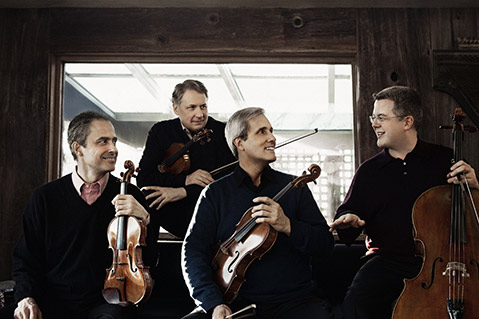Emerson String Quartet’s New Spirit of Discovery
Cellist Paul Watkins Makes His First Santa Barbara Appearance

For 34 years, the Emerson String Quartet (named for the icon of American letters Ralph Waldo Emerson) enjoyed enviable personnel stability, a sturdy square consisting of violinists Philip Setzer and Eugene Drucker, violist Lawrence Dutton, and cellist David Finckel. Solid relationships produced solid results, an award-winning sound that has netted nine Grammys, more than 40 acclaimed recordings (mostly on the prestigious Deutsche Grammophon label), and numerous awards, including Chamber Music America’s highest honor just this month.
But a year and a half ago, the inevitable occurred: One of the chairs vacated. Cellist Finckel, now 63, took the difficult decision to liberate more time for his commitments to the Chamber Music Society of Lincoln Center (he and his wife, pianist Wu Han, are artistic codirectors), Music@Menlo in California, and productions for his own record label, ArtistLed. “When David left, it was very sad but not in any way contentious,” violinist Setzer said. “It was very friendly, and he was thrilled that Paul Watkins was going to replace him — Paul was his first choice as well as ours.” The Welsh-born Watkins, 45, a brilliant cellist and accomplished conductor, interestingly, was not a specialized quartet player — not before a year and a half ago. And now his “O brave new world” epiphanies are spreading a spirit of discovery in the hearts of his three fellow musicians. This Saturday, February 7, the Emerson String Quartet performs at UCSB’s Campbell Hall. In anticipation, we spoke to Setzer by phone last week.
Tell me about receiving CMA’s Bogomolny National Service Award.
It was a really wonderful evening, a great honor. It was amazing to see so many of our friends there —presenters we have worked with over the years. The whole thing was very touching, very moving to us. Ken Fischer [president of the University Musical Society at the University of Michigan] spoke, and he listed all these things we did, and I kept thinking, “I didn’t really do all that! I think it was the other guys.”
You and Eugene Drucker founded this quartet nearly 40 years ago. What keeps you going?
Oh, a combination of things. First of all, it’s the music. We are so lucky to be able to spend our lives playing some of the greatest music ever written. You never get tired of playing Beethoven’s string quartets or Shostakovich or Mozart or any of the music that we do. I think that’s the big reason. The other part of it is that we still really enjoy each other; we have a great time.
And now we’re having this wonderful experience — the last two nights we played Op. 132 Beethoven and Beethoven’s harp quartet [String Quartet No. 10 in E Major], and Paul was playing each of those pieces for the first time in his life. Just the excitement, the thrill for him, I mean, it’s infectious for the rest of us. It’s wonderful to walk out onstage with somebody who is so gifted and so full of energy and curiosity and really appreciating the music and what we’re doing. I think it’s infused a kind of energy in the quartet that is — I wouldn’t say it wasn’t there before, but it’s just something new, something strange and very exciting.
Paul must be running hard to catch up with you guys.
He’s incredible. He’s so quick to learn and not just to learn the notes. He understands this music on every level in a way that’s really remarkable for someone who has not played that many string quartets in his life. He’s played a lot of chamber music and conducted, and he plays piano beautifully. But he’s extremely gifted and also just a lot of fun to be with.
4·1·1
UCSB Arts & Lectures presents the Emerson String Quartet in concert at UCSB’s Campbell Hall on Saturday, February 7, at 7 p.m. Call (805) 893-3535 or visit artsandlectures.sa.ucsb.edu for tickets and info.



